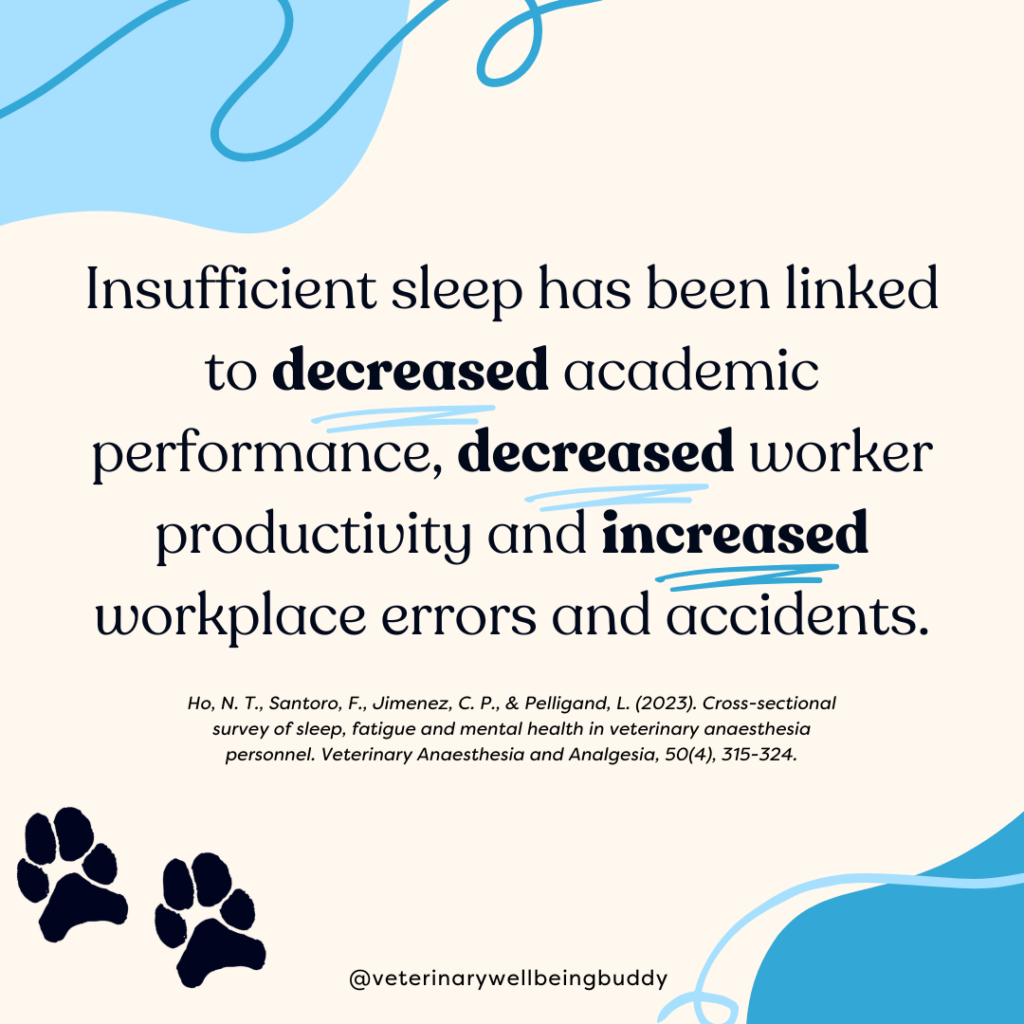
In recognition of National Sleep Awareness Week, it’s important for veterinary professionals and decision makers in veterinary medicine to be aware of the significant impact that sleep has on the health, well-being, and performance of veterinary teams. Adequate sleep is crucial for maintaining optimal functioning and overall health, as demonstrated by some of these key points below:
- Driving drowsy can be just as dangerous as driving buzzed or drunk: If you’ve gone 17 hours without sleep, your cognitive functioning and reaction times are similar to a blood alcohol content level (BAC) of 0.05, which is just under the legal limit. However, if you’ve gone 21 hours or more without sleep, your levels of functioning are similar to a BAC of 0.1, which is over the legal limit! (National Highway Traffic Safety Administration). If your veterinary staff are working while sleep-deprived, their performance may mimic the impairment seen with alcohol use.
- Chronic sleep loss is associated with increased health risks: On average, 1 in 3 adults within the United States reports that they get less than the recommended guidelines for sleep (CDC, 2022). Getting less than the recommended 7 hours of sleep per night can contribute to an increased risk of lifestyle-related chronic diseases, such as type 2 diabetes, obesity, cardiovascular disease, hypertension, certain cancers, depression, and cognitive decline. To promote a healthy workforce and reduce healthcare costs among your veterinary teams, it’s important to take scheduling into consideration for prioritizing adequate time for rest and recovery.
- Sleep deprivation is a risk factor for burnout: Sleep deprivation can arise from night shifts and rotating shift work, prolonged work hours due to scheduling or high workload. Factors such as interrupted sleep while on-call, moonlighting to address debt, concurrent primary sleep disorders, and inadequate recovery sleep can also contribute to sleep deprivation in physicians (Kanchlera et al., 2020). In an article examining insufficient rest on job performance for veterinary surgeons, it states “[t]he veterinary profession should recognize the impact of fatigue-related impairments as a management rather than a personal issue” (Steffey et al., 2023).
For veterinary professionals, who often work long and demanding hours, getting enough quality rest is essential for making sound decisions, providing top-notch care to patients, and maintaining their own well-being. When considering factors that impact human health, sleep deprivation is one of the most modifiable. Individuals facing ongoing sleep deficits should make conscious efforts to adjust their work and personal routines to enhance sleep quality, while seeking evaluation for any relevant medical conditions if needed.
Research shows that lack of sleep can lead to decreased cognitive function, impaired judgment, and increased risk of medical errors. By prioritizing sleep and creating a culture that values rest and work-life balance, veterinary teams can enhance their performance, reduce burnout, and improve patient outcomes.
As we observe National Sleep Awareness Month, let’s take this opportunity to raise awareness about the importance of sleep in veterinary medicine. By supporting your veterinary staff in getting the rest they need, we can ensure that veterinary professionals are well-equipped to provide the highest level of care to your pet patients.
In an effort to support the sleep habits of veterinary professionals, we are launching our VET REST: Better Sleep Bootcamp sleep coaching program this month! Head to veterinarywellbeingbuddy.com/sleep to learn more today!
**Bulk packages are available for purchase to provide to your veterinary staff, contact info@veterinarywellbeingbuddy.com to receive a quote for your team! **
REFERENCES
- Ho, N. T., Santoro, F., Jimenez, C. P., & Pelligand, L. (2023). Cross-sectional survey of sleep, fatigue and mental health in veterinary anaesthesia personnel. Veterinary Anaesthesia and Analgesia, 50(4), 315-324.
- Kancherla, B. S., Upender, R., Collen, J. F., Rishi, M. A., Sullivan, S. S., Ahmed, O., … & Gurubhagavatula, I. (2020). Sleep, fatigue and burnout among physicians: an American Academy of Sleep Medicine position statement. Journal of Clinical Sleep Medicine, 16(5), 803-805.
- Söderström, M., Jeding, K., Ekstedt, M., Perski, A., & Åkerstedt, T. (2012). Insufficient sleep predicts clinical burnout. Journal of occupational health psychology, 17(2), 175.
- Steffey, M. A., Risselada, M., Scharf, V. F., Buote, N. J., Zamprogno, H., Winter, A. L., & Griffon, D. (2023). A narrative review of the impact of work hours and insufficient rest on job performance. Veterinary Surgery, 52(4), 491-504.
- Steffey, M. A., Scharf, V. F., Risselada, M., Buote, N. J., Griffon, D., Winter, A. L., & Zamprogno, H. (2023). A narrative review of occupational scheduling that impacts fatigue and recovery relevant to veterinarian well-being. The Canadian Veterinary Journal, 64(7), 674-683.
- Steffey, M. A., Griffon, D. J., Risselada, M., Scharf, V. F., Buote, N. J., Zamprogno, H., & Winter, A. L. (2023). Veterinarian burnout demographics and organizational impacts: a narrative review. Frontiers in Veterinary Science, 10.
Be The First To Comment